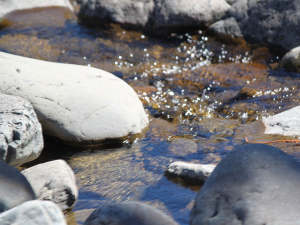'Give hunters a say on conservation' - ACT
ACT Party conservation spokesperson Cameron Luxton is calling for legislation that would ensure hunters and fishers have representation on the Conservation Authority.
 The Rangitikei Rivers Catchment Collective’s (RRCC) Mangawharariki sub-catchment group landowners have been monitoring the water quality monthly since January 2020.
The Rangitikei Rivers Catchment Collective’s (RRCC) Mangawharariki sub-catchment group landowners have been monitoring the water quality monthly since January 2020.
Investment by landowners to keep stock and sediment out of the Rangitikei River and its tributaries has been given the big tick from a population of Dwarf Galaxiids, which require healthy streams to survive.
Dwarf Galaxiids are small non-migratory fish native to New Zealand. According to the Department of Conservation (DOC), they belong to an ancient, scaleless fish family called Galaxiidae. Unlike whitebait, which migrate to see, some non-migratory Galaxiid species live out their entire life in the stream or river in which they hatch.
The Rangitikei Rivers Catchment Collective’s (RRCC) Mangawharariki sub-catchment group landowners fenced the main part of Mangawharariki River that runs through their farms and have been monitoring the water quality monthly since January 2020.
The Galaxiids were discovered during a stream health assessment workshop the farmer-led RRCC Mangawharariki group organised to look in-depth at stream health, by counting the number of macroinvertebrates within a section of the river.
Greg Clifton, Mangawharariki sub-catchment group chairperson, says it was “extremely rewarding” to find the fish.
“Landowners fenced the main river some time ago as a freshwater requirement and a few of us dedicated landowners have also been fencing along the tributaries of the river to keep sediment and nutrients out of the water,” Clifton says.
“This fish are not well-known, and it was hugely exciting to find the small fish,” says Louise Totman, RRCC catchment coordinator.
Since 2018, the collective has built a significant regional dataset of water quality monitoring.
Three to five years of data have been collected from nine of its 22 sub-catchment groups, and this is set to continue growing year-on-year.
“The fish are a good indicator of healthy water, and a lack of predators,” Totman says.
“Galaxiids are a perfect snack for introduced trout, but because of the old hydro power dam at the bottom of the Mangawharariki River, trout can’t get up this far,” she says.
RRCC is a farmer-led collective of rural residents and landowners working together with funding from the Ministry for Primary Industries (MPI) to protect the environment and enhance biodiversity in the Rangitikei, Turakina and Whangaehu River catchments. RRCC farmer members undertake monthly water quality monitoring at 88 sites across its 700,000ha catchment.
Agrisea NZ has appointed Craig Hudson as it's new chief growth officer.
State farmer Landcorp, trading as Pamu, is a forecasting a full-year net profit of around $100 million.
Tony Aitken, chief executive of Ruralco, has been awarded the Excellence in Business Leadership Award at the ANZ Business of the Year Awards.
Global trade has been thrown into another bout of uncertainty following the overnight ruling by US Supreme Court, striking down President Donald Trump's decision to impose additional tariffs on trading partners.
Controls on the movement of fruit and vegetables in the Auckland suburb of Mt Roskill have been lifted.
Fonterra farmer shareholders and unit holders are in line for another payment in April.

OPINION: Here w go: the election date is set for November 7 and the politicians are out of the gate…
OPINION: ECan data was released a few days ago showing Canterbury farmers have made “giant strides on environmental performance”.